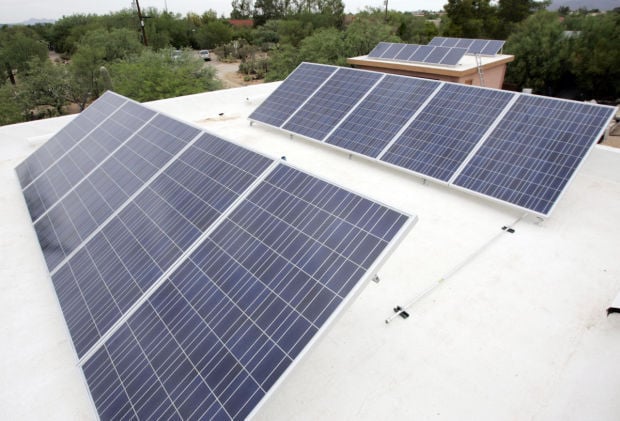PHOENIX — The state’s largest solar installer and largest electric utility agreed Thursday to withdraw conflicting ballot plans for how Arizona can regulate rates charged to customers who generate their own power.
The deal between SolarCity and Arizona Public Service came just hours after the Senate gave preliminary approval to putting two utility-backed proposals on the November ballot. They would have given the electric companies more control in cases in front of the Arizona Corporation Commission in determining how much solar customers have to pay.
Sen. Debbie Lesko, R-Peoria, who crafted one of them, said they are both now dead, at least for this year.
In exchange, SolarCity withdrew its petition drive to put its own measure on the ballot. It would have specifically barred utilities from charging solar customers based on their peak demand, versus simply their overall usage.
More significant, it would have put into the Arizona Constitution the current “net metering” policies that require utilities to pay customers as much for their excess power as they charge them for delivering what they need.
Several of the state’s major utilities already are trying to scrap those policies in favor of a rate structure that effectively would put more of the burden for operating the electric system on customers with rooftop solar.
SolarCity lobbyist Meghaen Dell’Artino said it made sense to back down rather than engage in what promised to be an extensive — and expensive — ballot fight, with neither side guaranteed a victory. Instead, she said these issues can be worked out among the parties, potentially putting a compromise in front of state utility regulators who ultimately get the last word in rate matters.
“The idea is that by putting all of our guns down that those conversations going into that rate case can be more fruitful so that all sides can thrive in the discussion,” Dell’Artino said.
What form that might take, however, remains up in the air.
Former utility regulator Kris Mayes, hired by SolarCity to run the initiative, said she envisions something like what utilities and solar advocates just agreed to in New York.
In essence, that preserves through 2019 the ability of those who have rooftop solar units to receive credits for the electricity they provide to utilities at the regular retail price. That is an important consideration for those debating whether it pays to buy or lease solar panels.
After that, however, state utility regulators would reduce that to a yet-to-be-determined figure.
Mayes said that’s a concept she believes could get the support not only of Solar City, in the business of those rooftop sales and rentals, but also the power companies. Most important, she said it avoids a protracted fight, not just at the ballot but also in front of the commission.
“The notion of settlement agreements is not unusual at the corporation commission,” she said. Mayes also said the deal involves a professional mediator as well as the input of the governor’s office.
Mayes acknowledged that, for the moment, the deal is between only APS and SolarCity.
“I would anticipate that, at some point in this process, Tucson Electric Power would come to the table as well would other solar companies,” she said.
Joseph Barrios, spokesman for UNS, the parent company of TEP and UniSource Energy, said his company opposed the SolarCity initiative and supported the alternatives offered by Lesko and Don Shooter of Yuma. And he applauded the decision of all sides to back down.
But Barrios would not commit his company to joining the mediation talks or agreeing to what is worked out. “We look forward to learning more about their discussions and the ideas they bring forward,” he said.That is significant because UniSource has an active rate case before the commission for parts of Mohave and Santa Cruz counties that involves imposing demand charges and reducing the amount the company pays for the power it buys from solar customers. TEP also has filed for similar changes in its service area.






